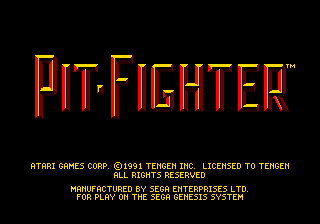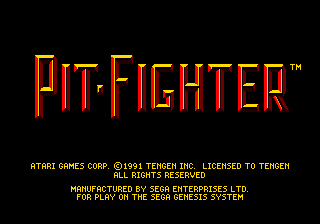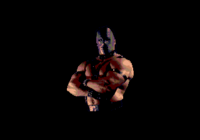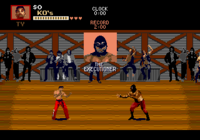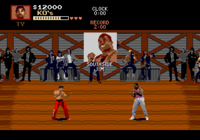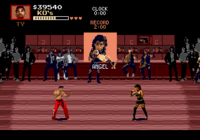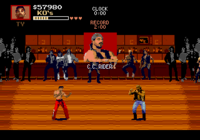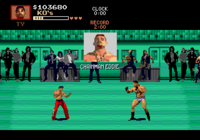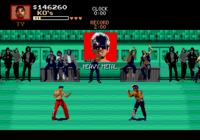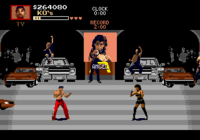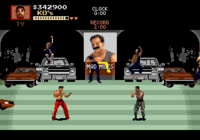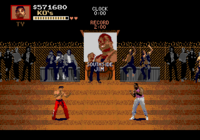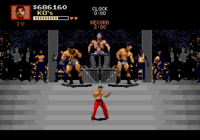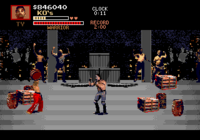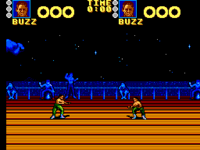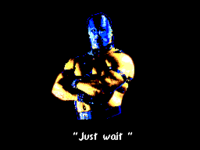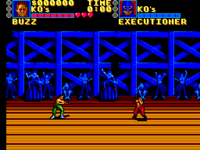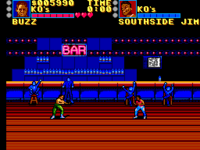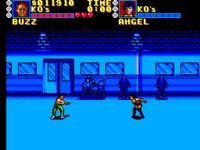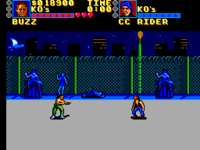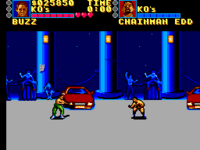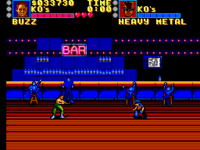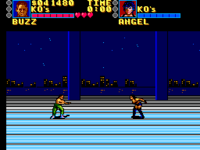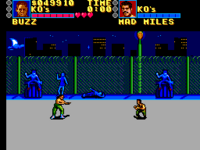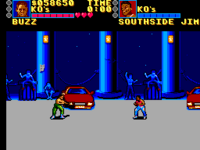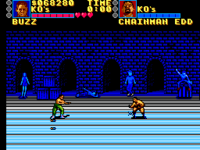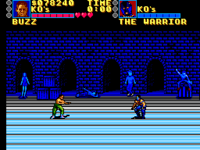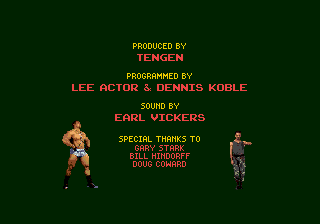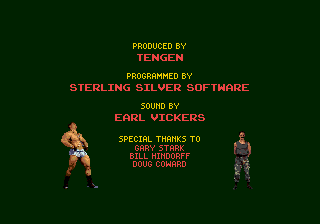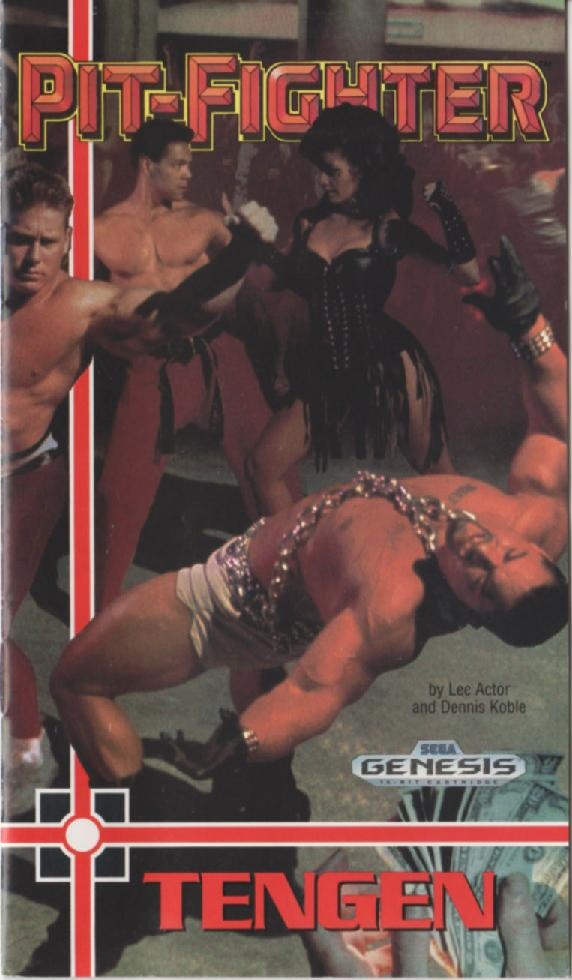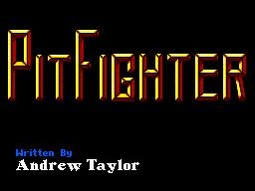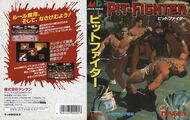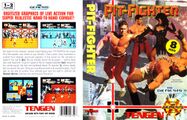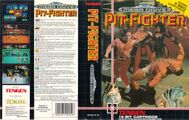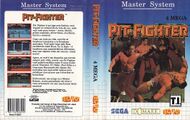Difference between revisions of "Pit-Fighter"
From Sega Retro
m (Text replacement - "[[Sega|" to "[[") |
|||
| Line 33: | Line 33: | ||
| md_rrp_us=59.95{{magref|gamepro|29|70}} | | md_rrp_us=59.95{{magref|gamepro|29|70}} | ||
| md_code_us=301027-0150 | | md_code_us=301027-0150 | ||
| + | | md_date_us_sc=199x | ||
| + | | md_rrp_us_sc=sub | ||
| + | | md_rating_us_sc= | ||
| md_date_eu=1992-04{{magref|segapro|6|9}} | | md_date_eu=1992-04{{magref|segapro|6|9}} | ||
| md_code_eu=301027-0170 | | md_code_eu=301027-0170 | ||
Latest revision as of 12:46, 14 November 2024
| Pit-Fighter | ||||||||||||||||||||||||||||||||||||||||||||||||||||||||||||||||||||||
|---|---|---|---|---|---|---|---|---|---|---|---|---|---|---|---|---|---|---|---|---|---|---|---|---|---|---|---|---|---|---|---|---|---|---|---|---|---|---|---|---|---|---|---|---|---|---|---|---|---|---|---|---|---|---|---|---|---|---|---|---|---|---|---|---|---|---|---|---|---|---|
| System(s): Sega Mega Drive, Sega Master System | ||||||||||||||||||||||||||||||||||||||||||||||||||||||||||||||||||||||
| Publisher: Tengen Domark | ||||||||||||||||||||||||||||||||||||||||||||||||||||||||||||||||||||||
| Developer: Sterling Silver Software The Kremlin | ||||||||||||||||||||||||||||||||||||||||||||||||||||||||||||||||||||||
| Supporting companies: The Doomsday Machine (music) | ||||||||||||||||||||||||||||||||||||||||||||||||||||||||||||||||||||||
| Distributor: Domark (EU) Ecofilmes (PT) Hent Gruppen (SE rental) Tec Toy (BR) Samsung (KR) | ||||||||||||||||||||||||||||||||||||||||||||||||||||||||||||||||||||||
| Licensor: Tengen Atari Games | ||||||||||||||||||||||||||||||||||||||||||||||||||||||||||||||||||||||
| Original system(s): Arcade boards | ||||||||||||||||||||||||||||||||||||||||||||||||||||||||||||||||||||||
| Developer(s) of original games: Atari Games | ||||||||||||||||||||||||||||||||||||||||||||||||||||||||||||||||||||||
| Sound driver: Lisa's Sound Driver[1] | ||||||||||||||||||||||||||||||||||||||||||||||||||||||||||||||||||||||
| Genre: Action[2][3] | ||||||||||||||||||||||||||||||||||||||||||||||||||||||||||||||||||||||
| Number of players: 1-2 | ||||||||||||||||||||||||||||||||||||||||||||||||||||||||||||||||||||||
| Official in-game languages: | ||||||||||||||||||||||||||||||||||||||||||||||||||||||||||||||||||||||
| ||||||||||||||||||||||||||||||||||||||||||||||||||||||||||||||||||||||
|
Pit-Fighter or Pit Fighter (ピットファイター) is a 1990 arcade fighting game by Atari Games. Tengen ported it to the Sega Mega Drive internationally in 1991. The Kremlin ported it to the Sega Master System with a new soundtrack by The Doomsday Machine and with Domark releasing it in Europe in 1992.
Contents
Gameplay
Mega Drive version
Like other early fighting games, such as SNK's Street Smart, gameplay resembles a beat-'em-up but structured around matches involving only two to four combatants. Fighters must punch and kick their opponents until only one of them has health remaining. Fights take place in a closed arena, surrounded by a raucous crowd. The crowd can interfere by attacking, dropping usable weapons, or pushing a stray player back into the fight.
Fighters can move from side to side with ![]() or
or ![]() but also back and forth with
but also back and forth with ![]() and
and ![]() . They dash with
. They dash with ![]()
![]() or
or ![]()
![]() . Fighters punch with
. Fighters punch with ![]() and kick with
and kick with ![]() . Punches are fast but do light damage, while kicks are slower but have better damage and reach. They jump with
. Punches are fast but do light damage, while kicks are slower but have better damage and reach. They jump with ![]() and jump kick with
and jump kick with ![]() +
+![]() (which can knock opponents down). They dodge attacks with
(which can knock opponents down). They dodge attacks with ![]() +
+![]() or duck with
or duck with ![]() +
+![]() +
+![]() . Fighters can be knocked down from being pummeled or thrown or having objects thrown at them, and the player must press any button multiple times to get back up. Fighters can be kicked while knocked down. Each fighter has three "super moves," which are special techniques that do more damage than normal moves and usually knock down opponents. Super moves are executed by pressing
. Fighters can be knocked down from being pummeled or thrown or having objects thrown at them, and the player must press any button multiple times to get back up. Fighters can be kicked while knocked down. Each fighter has three "super moves," which are special techniques that do more damage than normal moves and usually knock down opponents. Super moves are executed by pressing ![]() +
+![]() +
+![]() (with the exact move chosen randomly).
(with the exact move chosen randomly).
Weapons and objects such as knives, throwing stars, sticks, crates, or even motorcycles can be picked up by standing over them and pressing ![]() +
+![]() , then used or thrown with
, then used or thrown with ![]() . Weapons can increase the damage or range of the fighter's attacks. Some barrels contain a Power Pill power-up that makes the fighter temporarily stronger and take less damage from hits if picked up. Any fighter, including computer-controlled opponents, can pick up a Power Pill. Opponents can also be picked up with
. Weapons can increase the damage or range of the fighter's attacks. Some barrels contain a Power Pill power-up that makes the fighter temporarily stronger and take less damage from hits if picked up. Any fighter, including computer-controlled opponents, can pick up a Power Pill. Opponents can also be picked up with ![]() +
+![]() and thrown with
and thrown with ![]() .
.
The game can be played by one or two players simultaneously. There are three playable fighters and eight unplayable opponents. In two-player games, opponents are battled cooperatively in four-person fights. If the second player joins in the middle of a one-player match (by pressing START ), the match is finished as a three-person fight, but subsequent fights are four-person matches. Though players can hurt each other, it is only necessary to defeat the computer-controlled opponents. Players are rewarded cash (acting as the score) after each match for knockouts, "brutality," and completing the match.
Players do not have their health replenished after each match. Instead, each player starts the game with three lives and loses one whenever the fighter's health bar is emptied. A match can be continued (optionally with a different fighter) with a full health bar if the player has extra lives remaining. Otherwise, the game ends for that player.
Every third fight is a bonus round known as a Grudge Match. The loser of the match is whichever fighter is knocked down three times by his opponent. In a one-player game, the player fights against a computer-controlled clone of the player's chosen fighter. In a two-player game, the players fight each other. Losing a Grudge Match does not cost a life, but the winner gets bonus money.
The final battle, the Championship Match, is between one player and the Masked Warrior, a mysterious entity that taunts the players between matches. In two-player games, the Championship Match is preceded by a special Elimination Match where both players fight, with the winner going on to face the Masked Warrior alone.
Pressing ![]() at the title screen opens the options before starting the game. Players can set individual difficulty levels (higher is more difficult, with a default of 3 for each player) and set the game mode (Normal or Practice, with Practice simply being a Grudge Match).
at the title screen opens the options before starting the game. Players can set individual difficulty levels (higher is more difficult, with a default of 3 for each player) and set the game mode (Normal or Practice, with Practice simply being a Grudge Match).
Items
| Power Pill | |
|---|---|
| Increases the damage dealt and reduces the damage taken by the fighter if picked up. The fighter flashes while its effects are active. |
Fighters
| Buzz | |
|---|---|
| A former pro wrestler and bodybuilder. He is slow but strong. His Super Moves are the Killer Body Slam, Headbutt, and Piledriver. | |
| Ty | |
| A champion kickboxer and pit-fighter. He is quick and has powerful kicks. His Super Moves are the Flying Double Kick, Spin Kick, and Roundhouse. | |
| Kato | |
| A master of the Flying Dragon style of karate. He is fast and agile. His Super moves are the Lethal Dragon Punch, Flip Kick, and Backhand. |
Matches
There are eight opponents, but some of them opponents are fought more than once, for a total of ten matches before facing the Masked Warrior. Additionally, there are four Grudge Matches, fought after every two regular matches until the tenth match. In two-player games, the Championship Match against the Masked Warrior is preceded by an Elimination Match between the two players.
Master System version
The game is a fighting game where players must punch and kick their opponents until their energy runs out (the fighter turns blue when defeated). Fights take place in small arenas surrounded by a crowd. The player begins by choosing one of the three playable characters, who each have different moves, speeds, and powers.
Fighters can move in any direction using the D-Pad. If fighters wander into the audience members to the left or right edges, they are pushed back into the arena. They punch with ![]() and kick with
and kick with ![]() . They jump ahead by pressing
. They jump ahead by pressing ![]() +
+![]() and jump ahead with a kick by pressing
and jump ahead with a kick by pressing ![]() +
+![]() . Each fighter has a special move that can be performed with
. Each fighter has a special move that can be performed with ![]() +
+![]() . These moves can only be done a limited number of times per match (shown by three grey circles in the top of the screen). Some moves knock fighters over. Downed opponents can be attacked by pressing
. These moves can only be done a limited number of times per match (shown by three grey circles in the top of the screen). Some moves knock fighters over. Downed opponents can be attacked by pressing ![]() or
or ![]() when standing over them. Fighters can recover quicker from being knocked down by pressing the buttons rapidly.
when standing over them. Fighters can recover quicker from being knocked down by pressing the buttons rapidly.
Objects can be picked up by pressing ![]() +
+![]() , then thrown with
, then thrown with ![]() . Smaller objects, such as knives and shuriken, are used as projectile weapons. Larger objects, such as barrels and crates, are lifted over the fighter's head, preventing the fighter from moving until the object is thrown. Both kinds of object knock over the opponent on impact.
. Smaller objects, such as knives and shuriken, are used as projectile weapons. Larger objects, such as barrels and crates, are lifted over the fighter's head, preventing the fighter from moving until the object is thrown. Both kinds of object knock over the opponent on impact.
Players are awarded cash after each victorious battle, with extra cash awarded for using flying kicks and special moves or knocking the opponent down (called "KO's"). The player's health is not replenished between matches. If the player loses a match, the player must use a continue (shown by red hearts in the top of the screen) and attempt the fight again from the beginning with a full health bar, or the game ends if the player runs out of continues.
Every third fight is a bonus round known as a Grudge Match, fought against a clone of the player's chosen fighter. The winner is whichever fighter knock the other one down three times. Losing a Grudge Match does not cost a continue, but the winner gets bonus money. The final battle, the Championship Match, is against the final boss, the Masked Warrior.
Pressing ![]() at the title screen opens the options before starting the game. There are three difficulty levels (Easy, Medium, and Hard). The player can set the starting match (between 0 and 2, with 1 starting at the second match and 2 starting at the third match) and set the game mode (Normal or Practice, with Practice simply being a Grudge Match). Two-player games have three different game types: I (normal fight), II (same as I but no cash winnings), and III (same as I but no special moves). Two-player games are always competitive fights against each other rather than cooperative fights against computer opponents as in the arcade version and the Mega Drive port.
at the title screen opens the options before starting the game. There are three difficulty levels (Easy, Medium, and Hard). The player can set the starting match (between 0 and 2, with 1 starting at the second match and 2 starting at the third match) and set the game mode (Normal or Practice, with Practice simply being a Grudge Match). Two-player games have three different game types: I (normal fight), II (same as I but no cash winnings), and III (same as I but no special moves). Two-player games are always competitive fights against each other rather than cooperative fights against computer opponents as in the arcade version and the Mega Drive port.
Items
| Power Pill | |
|---|---|
| Increases the damage dealt and reduces the damage taken by the fighter if picked up. The word "POWER" appears below the fighter while the item's effects are active. |
Fighters
In two-player games, players are asked two times to choose a character: once from the options screen, then again after starting the game. The first time includes the fighters below as well as many of the opponents faced in the game; the second time only includes the three fighters below. Only the second selection counts (perhaps due to a programming error).
| Buzz | |
|---|---|
| A former pro wrestler who can perform the Body Slam. | |
| Ty | |
| A kickboxing champion who can perform the Flying Kick. | |
| Kato | |
| A karate black belt who can perform the Combo Punch. |
Matches
There are eight opponents, fought in ten matches (with two opponents appearing twice) before facing the Masked Warrior. There are four Grudge Matches, fought after every two regular matches until the tenth match.
Production credits
Mega Drive version
- Produced by: Tengen
- Programmed by: Sterling Silver Software
- Sound by: Earl Vickers
- Special Thanks to: Gary Stark, Bill Hindorff, Doug Coward
- Programmed by: Lee Actor, Dennis Koble
- Thanks to: Rusty Dawe
- Special thanks to the original coin-op team at Atari Games
- Graphic and Package Design: Louis Saekow Design
Master System version
- Written by: Andrew Taylor
- Graphics by: Matt Hicks
- Music by: The Doomsday Machine
- Additional Support: Dudley
- Produced by: Domark Software
- Licensed by: Sega Enterprises Ltd
- Developed by: The Kremlin (EU version only)
- Licensed by: Sega Enterprises Ltd. (C) 1992 (EU version only)
Versions
The digitised graphics of the original arcade game (later popularised by Mortal Kombat) were significantly degraded to fit the color limitations of the Mega Drive and the Master System. The arcade version also features sprite scaling to give the illusion of depth as fighters move toward or away from the player and three-player fights, which are both not present in the console ports.
Magazine articles
- Main article: Pit-Fighter/Magazine articles.
Promotional material
- Main article: Pit-Fighter/Promotional material.
Physical scans
Mega Drive version
| 74 | |
|---|---|
| Based on 34 reviews | |
| Mega Drive, SE (rental; Hent; orange) |
|---|
Master System version
| Sega Retro Average | |||||||||||||||||||||||||||||||||||||||||||||||||||||||||||||||||||||
|---|---|---|---|---|---|---|---|---|---|---|---|---|---|---|---|---|---|---|---|---|---|---|---|---|---|---|---|---|---|---|---|---|---|---|---|---|---|---|---|---|---|---|---|---|---|---|---|---|---|---|---|---|---|---|---|---|---|---|---|---|---|---|---|---|---|---|---|---|---|
|
| 48 | |
|---|---|
| Based on 13 reviews | |
Technical information
- Main article: Pit-Fighter/Technical information.
ROM dump status
| System | Hash | Size | Build Date | Source | Comments | |||||||||
|---|---|---|---|---|---|---|---|---|---|---|---|---|---|---|
| ? |
|
1MB | 1991-07 | Cartridge | Claimed to be a "beta" by No-intro, needs confirming. | |||||||||
| ✔ |
|
1MB | 1991-10 | Cartridge | ||||||||||
| ✔ |
|
512kB | Cartridge (BR) | |||||||||||
| ✔ |
|
512kB | Cartridge (EU) |
References
- ↑ http://vgmpf.com/Wiki/index.php?title=LSD_(GEN_Driver)
- ↑ File:PitFighter MD KR cover.jpg
- ↑ 3.0 3.1 https://sega.jp/history/hard/megadrive/software_l.html (Wayback Machine: 2020-07-02 23:21)
- ↑ Beep! MegaDrive, "March 1992" (JP; 1992-02-08), page 148
- ↑ GamePro, "June 1991" (US; 1991-xx-xx), page 40
- ↑ 6.0 6.1 GamePro, "December 1991" (US; 1991-xx-xx), page 70
- ↑ Sega Pro, "April 1992" (UK; 1992-03-19), page 9
- ↑ Sega Pro, "May 1992" (UK; 1992-04-16), page 7
- ↑ Computer Trade Weekly, "" (UK; 1992-04-27), page 17
- ↑ Sega Power, "February 1992" (UK; 1992-01-02), page 10
- ↑ Game Zone, "January 1992" (UK; 1991-12-18), page 27
- ↑ 12.0 12.1 Sega Pro, "April 1993" (UK; 1993-03-11), page 14
- ↑ 13.0 13.1 Computer & Video Games, "December 1992" (UK; 1992-11-15), page 78
- ↑ Sega Zone, "November 1992" (UK; 1992-10-28), page 10
- ↑ File:Pit Fighter MD credits.png
- ↑ File:Pit Fighter Rev A MD credits.png
- ↑ File:Pit Fighter MD US Manual.pdf, page 5
- ↑ File:Pit Fighter SMS credits.pdf
- ↑ 1700 igr dlya Sega, "" (RU; 2001-xx-xx), page 177
- ↑ Beep! MegaDrive, "April 1992" (JP; 1992-03-07), page 36
- ↑ Console XS, "June/July 1992" (UK; 1992-04-23), page 133
- ↑ Computer & Video Games, "March 1992" (UK; 1992-02-15), page 81
- ↑ Mean Machines: The Essential Sega Guide, "" (UK; 1993-11-18), page 79
- ↑ Game Zone, "January 1992" (UK; 1991-12-18), page 26
- ↑ Hippon Super, "April 1992" (JP; 1992-03-04), page 84
- ↑ Hobby Consolas, "Julio 1992" (ES; 1992-0x-xx), page 50
- ↑ Joypad, "Janvier 1992" (FR; 1991-12-1x), page 82
- ↑ Joystick, "Janvier 1992" (FR; 199x-xx-xx), page 116
- ↑ Sega Mega Drive Advanced Gaming, "November 1992" (UK; 1992-xx-xx), page 79
- ↑ Sega Mega Drive Advanced Gaming, "January 1993" (UK; 199x-xx-xx), page 93
- ↑ Mega Drive Fan, "June 1992" (JP; 1992-05-08), page 83
- ↑ Mega, "July 1993" (UK; 1993-06-17), page 32
- ↑ Mega, "December 1993" (UK; 1993-11-18), page 76
- ↑ Mega Action, "June 1993" (UK; 1993-05-20), page 64
- ↑ Mega Action, "Christmas 1993" (UK; 1993-12-02), page 80
- ↑ Mega Force, "Mai 1992" (FR; 1992-05-05), page 80
- ↑ MegaTech, "February 1992" (UK; 1992-01-20), page 28
- ↑ Mean Machines, "January 1992" (UK; 1991-12-27), page 58
- ↑ Mean Machines Sega, "October 1992" (UK; 1992-09-xx), page 140
- ↑ Player One, "Juillet/Août 1992" (FR; 1992-07-10), page 136
- ↑ Power Up!, "Saturday, March 07, 1992" (UK; 1992-03-07), page 1
- ↑ Power Play, "3/92" (DE; 1992-02-12), page 140
- ↑ Sega Power, "March 1992" (UK; 1992-02-06), page 26
- ↑ Sega Pro, "Christmas 1991" (UK; 1991-12-12), page 56
- ↑ Sega Pro, "November 1992" (UK; 1992-10-08), page 22
- ↑ Sega Pro, "April 1993" (UK; 1993-03-11), page 66
- ↑ Sega Force, "Februrary 1992" (UK; 1992-01-23), page 28
- ↑ Sega Saturn Magazine, "September 1995" (JP; 1995-08-08), page 85
- ↑ Supersonic, "Juillet/Août 1992" (FR; 1992-xx-xx), page 11
- ↑ Tricks 16 bit, "Tricks Sega Gold 800 igr" (RU; 1998-03-20), page 137
- ↑ Video Games, "2/92" (DE; 1992-04-06), page 28
- ↑ Consoles +, "Novembre 1992" (FR; 1992-1x-xx), page 129
- ↑ Consoles +, "Avril 1993" (FR; 1993-0x-xx), page 104
- ↑ Digitiser (UK) (1993-04-02)
- ↑ GamesMaster, "January 1993" (UK; 1992-12-03), page 90
- ↑ Joypad, "Avril 1993" (FR; 1993-0x-xx), page 86
- ↑ Mega Force, "Avril 1993" (FR; 1993-0x-xx), page 88
- ↑ Sega Power, "January 1993" (UK; 1992-12-03), page 37
- ↑ Sega Pro, "Christmas 1992" (UK; 1992-12-10), page 38
- ↑ Sega Pro, "April 1993" (UK; 1993-03-11), page 72
- ↑ Sega Zone, "December 1992" (UK; 1992-11-xx), page 65
- ↑ Video Games, "12/92" (DE; 1992-11-23), page 117
- ↑ Video Games, "7/93" (DE; 1993-06-30), page 99
| Pit-Fighter | |
|---|---|
|
Main page | Comparisons | Hidden content | Development | Magazine articles | Video coverage | Reception | Promotional material | Region coding | Technical information | Bootlegs | |
- 1-2 player games
- JP Mega Drive games
- All JP games
- US Mega Drive games
- All US games
- US Sega Channel games
- EU Mega Drive games
- All EU games
- PT Mega Drive games
- All PT games
- UK Mega Drive games
- All UK games
- SE Mega Drive games
- All SE games
- AU Mega Drive games
- All AU games
- KR Mega Drive games
- All KR games
- Mega Drive games
- 1991 Mega Drive games
- All 1991 games
- Mega Drive action games
- All action games
- EU Master System games
- PT Master System games
- UK Master System games
- BR Master System games
- All BR games
- Master System games
- 1993 Master System games
- All 1993 games
- Master System action games
- All games
- Old technical information
- Pit-Fighter
